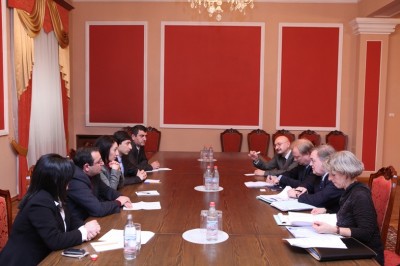Leaders of the two opposition parties represented in Armenia’s parliament accused on Monday a top representative of the Council of Europe’s Parliamentary Assembly (PACE) of blatant pro-government bias after meeting him to discuss the political situation in the country.
Senior parliamentarians from the Armenian Revolutionary Federation-Dashnaktsutyun and the Heritage (Zharangutyun) party said that John Prescott, a PACE co-rapporteur on Armenia, rudely brushed aside their concerns about the forthcoming parliamentary elections and human rights abuses.
Prescott arrived in Yerevan to discuss ongoing preparations for the elections scheduled for May and assess the Armenian authorities’ compliance with a PACE resolution adopted last October.
The resolution urged the authorities to hold “genuinely democratic parliamentary elections,” reform the law-enforcement and judicial systems and create a “pluralist media environment.” It said this is essential for preventing a repeat of the deadly 2008 street violence in Yerevan.
Prescott, who served as Britain’s deputy prime minister from 1997-2007, was due to travel to Armenia together with Axel Fischer, the other PACE co-rapporteur. But Fischer cancelled trip at the last minute, citing health reasons.
The British parliamentarian began the fact-finding visit with a meeting with members of the Armenian parliamentary delegation at the PACE. One of them, Dashnaktsutyun’s Armen Rustamyan, presented the Armenian opposition’s unanimous view that large-vote rigging will be more difficult if the elections are held only on the party-list basis.
“For some reason, my arguments angered Mr. Prescott and I couldn’t understand why,” Rustamyan told RFE/RL’s Armenian service (Azatutyun.am). “The debate between us heated up a little at that point.”
“I couldn’t understand why he reacted so emotionally and angrily. Naturally I countered that,” he said.
Prescott’s ensuing meeting with Heritage’s parliamentary faction was also apparently tense. Stepan Safarian, a faction member, said he promised to communicate the opposition demands for electoral reform to the Strasbourg assembly. But Safaryan said Prescott refused to discuss Zharangutyun concerns about human rights abuses allegedly committed by Armenian law-enforcement bodies and their controversial criminal investigation into the 2008 unrest.
“He had no desire to listen to us,” Zaruhi Postanjyan, another Zharangutyun deputy, told RFE/RL’s Armenian service (Azatutyun.am). “He said his mission is to document what is going on right now.”
“When you present facts or express an opinion and your interlocutor bangs the table with his fist in response that means he is biased,” Postanjyan said. “He did not want to hear evidence from us because he would have to evaluate that evidence in his report.”
Rustamyan, for his part, claimed that Prescott may have secretly promised to assist the Armenian authorities in blocking the voting reform favored by the opposition. “Prescott wants to be a tool in their hands,” charged the normally reserved Dashnaktsutyun leader.
Prescott refused to comment when approached by an RFE/RL correspondent in the parliament.
The PACE representative was due to meet later in the day with leaders of the Armenian National Congress (HAK), a non-parliamentary opposition group that has been highly critical of the Council of Europe. He will meet with President Serzh Sargsyan, parliament speaker Samvel Nikoyan and Tigran Mukuchyan, chairman of the Central Election Commission, on Tuesday.
Prescott also agreed to schedule an unplanned meeting with relatives of opposition protesters killed in the March 2008 clashes with security forces. They will likely complain about the results of a fresh inquiry into the unrest that were announced by Armenia’s Special Investigative Service (SIS) late last month.
John Prescott also had a separate meeting with Members of the ARF-D Parliamentary Faction who expressed to him that it is with reservations that the party has agreed to the conclusions of the ad hoc committee appointed to monitor the March 1, 2008 post-elections episodes, meaning investigating the deaths of 10, informing society and taking under account those conclusions ARF-D suggested that a new ad hoc committee should be assigned to conduct the monitoring. ARF-D’s suggestion was rejected by the majority and the monitoring right was reserved for the National Assembly’s Standing Committee on State and Legal Affairs.
Referring to the Electoral Code, the ARF-D Members of Parliament said that the ARF-D and Heritage (Zharangutyun) parties’ proposed changes were again rejected by the majority and that at the moment the two parties insist on their joint proposition to adopt a 100% proportional electoral system.
The ARF-D MPs suggested to Prescott that for the upcoming elections as many observers as possible should be sent, so that by being present at the polling stations during the whole process they can draw a picture of the actual situation. The MPs informed Prescott on ARF-D’s position about the necessity of making available to the public the lists of the voters, after the elections have concluded.
Lord Prescott replied that as far as the passing to a proportional system is concerned the decision should be made collectively by the political parties after having put this issue up for discussion. Referring to his own personal views the PACE co-rapporteur stated that he is in favor of keeping the single-seat constituency system. He also added that for such a change a referendum should take place but in this short period of time [up to the elections of May 6] that is highly difficult.
Finally, Lord Prescott informed his ARF-D interlocutors that the NA’s Standing Committee has made a report in relation to the March 1 events and that he will get familiar with that during his stay in Armenia and get all the necessary information so as to include them in his report.








